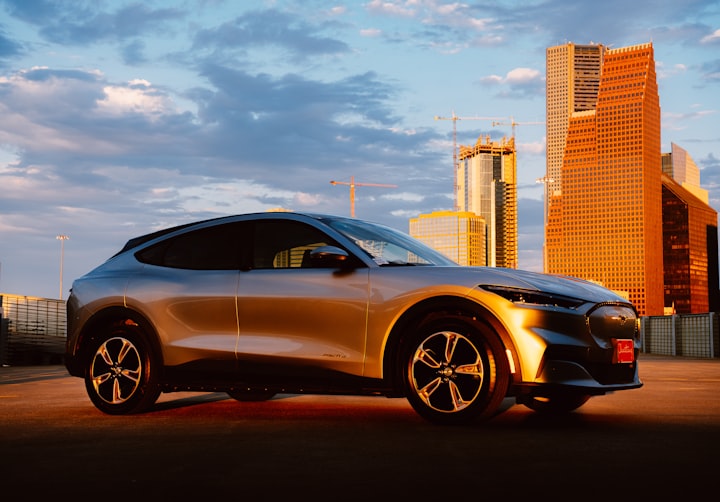Content warning
This story may contain sensitive material or discuss topics that some readers may find distressing. Reader discretion is advised. The views and opinions expressed in this story are those of the author and do not necessarily reflect the official policy or position of Vocal.

The automotive industry has seen significant changes in recent years, with five key innovations.
1. Electric Vehicles (EVs): EVs offer a cleaner and more sustainable alternative to traditional internal combustion engine vehicles, with advancements in battery technology making them more practical for everyday use. Companies like Tesla, Nissan, and Chevrolet have led the way in popularizing EVs, prompting other manufacturers to invest heavily in electric mobility.

2. Autonomous Driving Technology: Companies like Waymo, Tesla, and Uber are developing vehicles equipped with sensors, cameras, and advanced algorithms to navigate roads without human intervention. Features like adaptive cruise control, lane-keeping assistance, and automated parking are becoming increasingly common in modern vehicles, paving the way for safer and more efficient commuting.

3. Connected Car Technology: Connected cars enable vehicles to communicate with each other, infrastructure, and external devices, enhancing safety, convenience, and entertainment for drivers and passengers. Companies like Google with Android Auto and Apple with CarPlay are integrating smartphones seamlessly into car infotainment systems, blurring the lines between digital and automotive lives.

4. Advanced Driver Assistance Systems (ADAS): ADAS technologies include adaptive cruise control, automatic emergency braking, blind-spot monitoring, and lane departure warning systems. By leveraging sensors, cameras, and radar, ADAS technologies can detect potential hazards and provide warnings or intervene to prevent accidents, making driving safer for everyone on the road.

5. Vehicle-to-Everything (V2X) Communication: V2X communication enables vehicles to communicate with each other and surrounding infrastructure, facilitating smoother traffic flow and reducing accident risks.
The future of cars is a dynamic and transformative one, driven by technological advancements and evolving consumer preferences.
Electric vehicles (EVs) are expected to dominate the market, offering longer ranges, faster charging times, and reduced costs. Self-driving cars will revolutionize the way we commute, with advanced sensors, artificial intelligence, and connectivity enabling safe navigation without human intervention.
Cars will become increasingly connected to the internet and other vehicles, forming part of the Internet of Things (IoT) ecosystem. Sustainable materials, such as recycled plastics and bio-based composites, will be prioritized in vehicle production to reduce carbon emissions and minimize environmental impact.
Personalization will be enabled through AI and data analytics, enhancing comfort and convenience. Augmented reality (AR) technology will overlay digital information onto the real-world environment, providing drivers with vital information like navigation prompts, hazard warnings, and vehicle diagnostics.
Health and wellness will be prioritized in future cars, with built-in sensors and biometric monitoring systems tracking vital signs and detecting signs of fatigue or illness.
Urban mobility solutions will shift towards more efficient and sustainable options, including electric scooters, bicycles, micro-mobility services, and ride-sharing and on-demand transit options. Energy efficiency will be prioritized through lightweight materials, aerodynamic designs, and regenerative braking systems, reducing fuel consumption and emissions while extending the range of electric vehicles.
Enhanced safety features will become standard features in future cars, with collision avoidance systems, pedestrian detection, and vehicle-to-vehicle communication becoming standard features.
This revolutionary future of cars will reshape the way we think about transportation and contribute to a more sustainable and environmentally friendly future.
The future of cars is poised to be both exciting and transformative, driven by technological innovation, sustainability, and evolving consumer demands. From electric and autonomous vehicles to connected and personalized experiences, the automotive industry is on the brink of a revolution that will reshape the way we think about transportation.
About the Creator
Praveen Pk
I like share my thoughts to others and love to be connected
PUSH YOURSELF,BEACUSE NO ONE ELSE IS GIONG TO DO IT FOR YOU.
Subscribe for more content and STAY WITH ME
Enjoyed the story? Support the Creator.
Subscribe for free to receive all their stories in your feed. You could also pledge your support or give them a one-off tip, letting them know you appreciate their work.
Reader insights
Nice work
Very well written. Keep up the good work!
Top insights
Compelling and original writing
Creative use of language & vocab
Expert insights and opinions
Arguments were carefully researched and presented






Comments
There are no comments for this story
Be the first to respond and start the conversation.